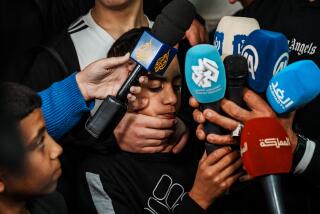A child soldier or just a child?
GUANTANAMO BAY, CUBA — Two days after he was pulled unconscious from the rubble of a bombed Al Qaeda compound in southern Afghanistan, 15-year-old Omar Khadr lay strapped to a gurney, his left eye blinded by shrapnel, gunshot wounds to his back still raw.
U.S. agents who conducted the first interrogation of the Canadian teen at Bagram air base near Kabul on July 29, 2002, gauged the effects of their questioning by the blood pressure meter attached to their inert subject. The injured teen could do little more than grunt.
The latest, and possibly last, sessions of the Guantanamo war crimes tribunal have revealed disturbing details about how Khadr was treated during three months at Bagram in the custody of U.S. forces who were convinced he had thrown a grenade that killed an American soldier.
Subsequent interrogations during more than six years in U.S. custody have involved snarling dogs, “stress positions” and being upended by guards and used as a human mop to clean the floor.
Khadr is one of at least a dozen juveniles captured and brought to Guantanamo in the Bush administration’s post-Sept. 11 war on terrorism. Among the 19 Guantanamo prisoners charged with war crimes, Khadr and Mohammed Jawad, an Afghan thought to be a year younger than the Canadian, are the only ones who were juveniles at the time of their alleged offenses.
Human rights advocates consider the prosecution of Khadr and Jawad another blot on the Guantanamo prison and tribunal. Neither was accorded the protections promised by treaties the U.S. signed.
“Under international law, adults who recruit children for combat are to be prosecuted for that offense. But the children caught up in combat are to be protected, not prosecuted,” said Diane Marie Amann, a UC Davis law professor who observed the latest hearing in Khadr’s case for the National Institute of Military Justice.
The institute joined legal scholars, parliamentarians and human rights proponents in arguing in amicus briefs that underage combatants should be treated as victims, not responsible adults who made conscious decisions to join the fight.
Khadr’s trial is set to begin Jan. 26, with pretrial hearings starting on the eve of the inauguration of President-elect Barack Obama, who has vowed to shut Guantanamo.
Khadr was a toddler when his father began shuttling his family between Toronto and the Islamic militant strongholds along the Pakistan-Afghanistan border.
Now 22, Khadr has spent almost a third of his life in U.S. custody. He was raised in a militant Muslim family and was surrounded in his teen years by holy warriors. His lawyers describe him as confused, immature and emotionally damaged.
Seven inches taller than when he arrived, the 6-foot-3 Khadr could be seen on a recent weekday walking alone through the laundry-strewn courtyard outside his Camp 4 bunkhouse, behind fences topped by concertina wire and under the gaze of guards in watchtowers. He perused the tattered offerings of a library cart and selected an issue of National Geographic.
The Geneva Conventions and the U.N. Convention on the Rights of the Child hold that it is the responsibility of the state whose soldiers capture juveniles on the battlefield to work to rehabilitate and integrate them into society. Appeals for consideration of Khadr and Jawad’s age have been consistently rebuffed at the tribunal.
Army Col. Patrick Parrish has ruled that Khadr’s trial can go forward on charges of murder, attempted murder, spying, conspiracy and material support for terrorism. His predecessor as judge in the case, Army Col. Peter E. Brownback III, ruled last spring that the defendant’s age and upbringing were “interesting as a matter of policy” but irrelevant to prosecution under the Military Commissions Act of 2006.
Jawad’s military judge, Army Col. Stephen R. Henley, ruled similarly on the child soldier question(child%20soldier).pdf but excluded evidence the government was relying on to convict the Afghan of attempted murder and other charges. Henley ruled that Jawad’s confessions were coerced, a decision prosecutors have asked the Court of Military Commission Review to overturn, but it is unclear when that appeal will be decided.
“My hope is that the Obama administration, as its first action, will say, ‘We don’t want to be the first administration in history to preside over the trial of a child soldier for war crimes,’ ” said Navy Lt. Cmdr. William C. Kuebler, Khadr’s lead defense lawyer.
Kuebler said he was troubled by the mid-December hearing before Parrish, who refused to allow him to introduce as evidence photographs taken at the scene of the July 27, 2002, firefight near Khowst, Afghanistan, in which Khadr is charged with throwing the grenade that killed Army Sgt. 1st Class Christopher Speer.
The photographs taken by U.S. soldiers as they stormed the bombed-out compound show Khadr lying facedown in the dirt under the blasted remnants of a roof. The soldiers didn’t know he was there until one stepped on rubble and felt something underneath give way.
Kuebler said Khadr could hardly have thrown the grenade that killed Speer if he was buried and unconscious when the Delta Force soldier entered.
Guantanamo supporters defend Khadr’s treatment. The tribunal’s chief prosecutor, Army Col. Lawrence J. Morris, dismisses critics’ contentions that juveniles are prohibited from being held accountable for war crimes by the U.N. Convention on the Rights of the Child and a supplemental protocol.
“The convention is misunderstood, if not intentionally misrepresented,” Morris said.
“It is not a bar to prosecution.”
Army Capt. Keith Petty, on the prosecution team in Khadr’s case, said it was up to military jurors at sentencing to consider a convict’s age at the time of the offense.
Radhika Coomaraswamy, the U.N. special representative for children in armed conflict, lodged a protest over Khadr’s prosecution, warning that it could set a precedent and undermine the protections intended by the convention.
U.N. tribunals established to prosecute alleged war criminals from Yugoslavia, Sierra Leone and Rwanda have tended to treat child soldiers as victims. David Crane, a Syracuse University law professor who served as chief prosecutor in the Special Court for Sierra Leone, wrote that “no child had the mental capacity to commit mankind’s most serious crimes.”
Canadian politicians have resisted calls to bring Khadr to his homeland for trial, though Kuebler hopes the impending change of U.S. administrations will apply new pressure on Ottawa to demand the repatriation of Guantanamo’s last Western detainee.
--
More to Read
Sign up for Essential California
The most important California stories and recommendations in your inbox every morning.
You may occasionally receive promotional content from the Los Angeles Times.











